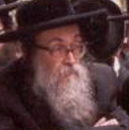Rabbi Chanina Avrohom Leitner Passes Away at 78
Religious Jewry is deeply saddened this week at the passing of Rabbi Chanina Avrohom Leitner early Tuesday morning, after a brief illness. He is mourned in all circles, especially in the community of followers of Rabbi Yoel Teitelbaum of Satmar, of whom the deceased was one of the foremost disciples. He was an important link to previous generations, and his passing left a void that cannot be filled.
Rabbi Leitner was born in Elul 5690 (1929) to his father Rabbi Naftali Tzvi Leitner of Grossvardein, Hungary. Already in his youth, Rabbi Avrohom Leitner was noted for his sharp mind and unusual diligence in Torah study. He survived the Nazi Holocaust by escaping in 1944 from the ghetto of Grossvardein, fleeing over the border to Romania, and boarding a ship bound for Turkey. From there he went by train to Palestine and studied in the yeshiva of Rabbi Yosef Tzvi Dushinsky in Jerusalem. For four years he studied under Rabbi Dushinsky, who became his mentor and principal Torah teacher.
In 1948, as war stormed between the Zionists and the Arabs, Rabbi Leitner began looking for a way to escape from Palestine. One of his friends in yeshiva was the son of the Veitzener Rav of Chicago. He wrote to his father asking for him to arrange American visas for himself and for Rabbi Leitner. Rabbi Leitner arrived safely in the United States and soon afterward married the Veitzener Rav's daughter. The Satmar Rebbe made a special trip to Chicago to officiate at the wedding.
After the wedding, Rabbi Leitner moved to Williamsburg and learned for many years under the Satmar Rebbe, becoming one of his most trusted disciples. Some of his closest colleagues were Rabbi Shimon Yisroel Posen (the Shoproner Rav), the Krasner Rav and the Wiedslover Rav. In 1960, on the Rebbe's recommendation, he took the position of rabbi of Montevideo, Uruguay. In 1964, he returned to Williamsburg, where the Rebbe appointed him as a lecturer in the Satmar Yeshiva. Later he opened his own yeshiva, Binyan David, where he taught Torah for decades to hundreds of students.
From his youngest years and on, Rabbi Leitner's heart was pained by the great desecration of G-d's name wrought by the Zionist state. In every battle against Zionism, he was one of the foremost activists. In 1949, he personally traveled to the Holy Land to ensure that the new immigrant children from Romania would be placed in good educational institutions and not fall into the hands of the evildoers. He also fought the battle for the Moroccan children and later the Yemenite children. The Satmar Rebbe put great trust in him, and even selected him to review his great work against Zionism, Vayoel Moshe, before publication, although he was only 30 years old at the time.
At every protest organized by the Central Rabbinical Congress and Jews Against Zionism, Rabbi Leitner was a prominent speaker. (Video clips of his speeches can be viewed on this website.)
http://www.jewsagainstzionism.com/mediaclips/index.cfm
Every year on the bitter day of Zionist independence (5 Iyar), Rabbi Leitner would give a speech in the Nesivos Olam Malachim synagogue, crying and mourning over the Zionists' insult to the Torah, rebellion against G-d and against the nations of the world.
In 1980, after the passing of Rabbi Yoel Teitelbaum, when a split threatened to break down the authority of the anti-Zionist Edah Charedis rabbinical court of Jerusalem, Rabbi Leitner stood by the side of the newly appointed Satmar Rebbe Rabbi Moshe Teitelbaum at the forefront of the battle to maintain the Edah.
Rabbi Avrohom Leitner always supported the activities of Jews Against Zionism, and his advice and guidance were sought by the organization on many occasions. May his memory be a blessing.
